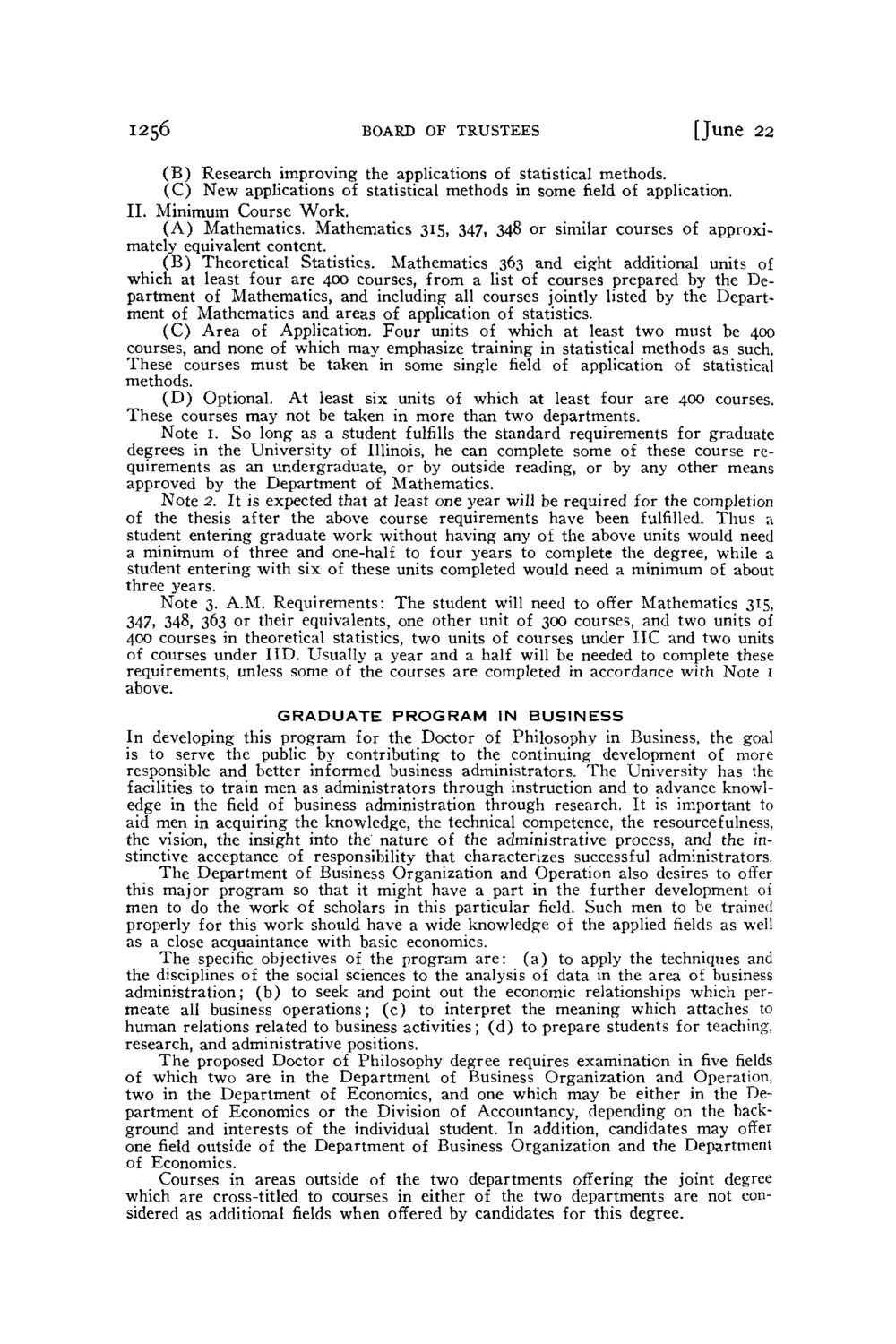| |
| |
Caption: Board of Trustees Minutes - 1950
This is a reduced-resolution page image for fast online browsing.

EXTRACTED TEXT FROM PAGE:
1256 BOARD OF TRUSTEES [June 22 ( B ) Research improving the applications of statistical methods. (C) New applications of statistical methods in some field of application. II. Minimum Course Work. ( A ) Mathematics. Mathematics 315, 347, 348 or similar courses of approximately equivalent content. ( B ) Theoretical Statistics. Mathematics 363 and eight additional units of which at least four are 400 courses, from a list of courses prepared by the Department of Mathematics, and including all courses jointly listed by the Department of Mathematics and areas of application of statistics. ( C ) Area of Application. Four units of which at least two must be 400 courses, and none of which may emphasize training in statistical methods as such. These courses must be taken in some single field of application of statistical methods. ( D ) Optional. At least six units of which at least four are 400 courses. These courses may not be taken in more than two departments. Note I. So long as a student fulfills the standard requirements for graduate degrees in the University of Illinois, he can complete some of these course requirements as an undergraduate, or by outside reading, or by any other means approved by the Department of Mathematics. Note 2. It is expected that at least one year will be required for the completion of the thesis after the above course requirements have been fulfilled. Thus a student entering graduate work without having any of the above units would need a minimum of three and one-half to four years to complete the degree, while a student entering with six of these units completed would need a minimum of about three years. Note 3. A.M. Requirements: The student will need to offer Mathematics 315, 347, 348, 363 or their equivalents, one other unit of 300 courses, and two units of 400 courses in theoretical statistics, two units of courses under IIC and two units of courses under I I D . Usually a year and a half will be needed to complete these requirements, unless some of the courses are completed in accordance with Note 1 above. GRADUATE PROGRAM IN BUSINESS In developing this program for the Doctor of Philosophy in Business, the goal is to serve the public by contributing to the continuing development of more responsible and better informed business administrators. The University has the facilities to train men as administrators through instruction and to advance knowledge in the field of business administration through research. It is important to aid men in acquiring the knowledge, the technical competence, the resourcefulness, the vision, the insight into the nature of the administrative process, and the instinctive acceptance of responsibility that characterizes successful administrators. The Department of Business Organization and Operation also desires to offer this major program so that it might have a part in the further development of men to do the work of scholars in this particular field. Such men to be trained properly for this work should have a wide knowledge of the applied fields as well as a close acquaintance with basic economics. The specific objectives of the program are: ( a ) to apply the techniques and the disciplines of the social sciences to the analysis of data in the area of business administration; (b) to seek and point out the economic relationships which permeate all business operations; (c) to interpret the meaning which attaches to human relations related to business activities; ( d ) to prepare students for teaching, research, and administrative positions. T h e proposed Doctor of Philosophy degree requires examination in five fields of which two are in the Department of Business Organization and Operation, two in the Department of Economics, and one which may be either in the Department of Economics or the Division of Accountancy, depending on the background and interests of the individual student. In addition, candidates may offer one field outside of the Department of Business Organization and the Department of Economics. Courses in areas outside of the two departments offering the joint degree which are cross-titled to courses in either of the two departments are not considered as additional fields when offered by candidates for this degree.
| |